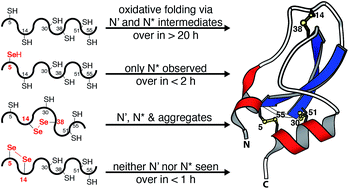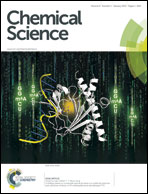Harnessing selenocysteine reactivity for oxidative protein folding†
Abstract
Although oxidative folding of disulfide-rich proteins is often sluggish, this process can be significantly enhanced by targeted replacement of cysteines with selenocysteines. In this study, we examined the effects of a selenosulfide and native versus nonnative diselenides on the folding rates and mechanism of bovine pancreatic trypsin inhibitor. Our results show that such sulfur-to-selenium substitutions alter the distribution of key folding intermediates and enhance their rates of interconversion in a context-dependent manner.

- This article is part of the themed collection: ISACS16: Challenges in Chemical Biology

 Please wait while we load your content...
Please wait while we load your content...